 |
April's Recipe:
Halvas with Semolina
(Farina)

|
Ingredients:
|
- 3 cups semolina (farina)
- 1 1/2 cups oil
- 3 cups sugar
- 9 cups water
- 1/2 cup pignolias or almonds and powdered cinnamon
|
Preparation:
Preheat the oven to 450°F.
Boil for a while the water and sugar to form a light syrup. Melt butter or oil in a wide saucepan. add the farina, stirring constantly with a spoon until it becomes a light gold color. 5 minutes before it is ready, add
the pignolias or blanched almonds, cut in 3-4 pieces, in order to color lightly. Pour the boiled water and sugar syrup into farina mixture, mixing until smooth. Reduce heat, cover pan and let it stand for half an hour for farina to puff and absorb the syrup. When half cool, turn into pudding molds or serve in dessert plates by by spoonfuls, and sprinkle with powdered cinnamon mixed with powdered sugar.
(265 calories per serving)
|

Excerpts
and Photography from:
Greek Cookery
by Nicholas Tselementes
|
|
Short on ingredients? |
|

Mythology Organic Extra Virgin Olive Oil from Crete 750ml |
|

Misko Coarse (Thick) Semolina from Greece |
|
 |
|
April's Article: |
| The Greeks of Australia |
The Greeks of Australia
These bonds of friendship between the Australian people and
Greek settlers were further augmented with the dispatch of
17,000 Australian soldiers to the Greek Front (January 1941) and
more so with the return of Australian veterans from the
fronts of Macedonia and Crete. The returning soldiers told
stories of gallant sacrifices performed by Greek families to
save Australian and New Zealand soldiers, placing their own
children at risk. It was only then the Australian people
universally began to understand the Greek temperament.
Furthermore the War triggered an era of progress and prosperity
for Greek Australians. The years that followed witnessed the
massive transfusion into Australia of hundreds of thousands
of young Greek migrants, thus establishing numerically the
second largest ethnic group, after the Italians.
After World War II
The period of massive immigration coincides with the end of
World War II and the absorption of a large number of
political refugees from Eastern Europe. During this period the
pre-War chain migration was replaced by mass migration. In
addition to refugees, the Australian government actively
recruited immigrants from all over Europe at this time for
reasons related to security and economic growth. Australia's
involvement in the war n South-East Asia and the Japanese
invasion of Australian colonies in Papua New Guinea and attacks
on Darwin and Sydney, altered the overall attitude of the
seven million people living on this continent and embedded in
them the feeling that Asia was a threat. In addition, the
population and birthrate of Australia was insufficient to cover
the security and economic needs of this country following
World War II. Prime Minister John Curtin was convinced that
Australia should financially support the intake of a large
number of immigrants who could contribute to the country's
defense against the 'yellow peril' and who could bolster the
number of skilled and unskilled workers needed to create
economic growth. The establishment of the Immigration
Department (12 July 1945), with Arthur Calwell as the first
Minister, aimed to increase the net population by countries
(Malta and Italy were among the first) and took responsibility
for the immigration of millions of European migrants.
The relevant agreement with Greece was signed in 1952,
triggering the transplantation of over 250,000 Greek and Cypriot
migrants from Greece (1952-74), Rumania (1952-8), Egypt and the
Middle East (1952-2), Cyprus (1974-84) and other
politically turbulent countries of Eastern Europe and Latin
America. After 1974, following the restoration of democracy
in Greece and the prevailing favorable economic situation,
Greece stopped exporting migrants and received massive waves
of repatriating Greeks form around the globe. During this
period, the last wave of Greeks from South Africa settled in
Australia (1992-2004) amid the instability and the persecutions
following the post-colonial apartheid administration.
Greek and foreign shipping lines began to bring to Australia
hundreds of Greeks sponsored by the Inter-Governmental
Committee of European Migration (ICEM). At every arrival of
Kyreneia or Patris, for instance, over 1200 Greeks were
welcomed by consular and church authorities. Every arrival
became a social event, attended not only by relatives and
friends but also by thousands of onlookers who would go go the
wharf to simply become part of the event and to meet other
friendly people. This also gave a psychological boost to the
incoming 'new Australians' arriving in a strange land.
Article to be continued next month
|
|
Special Feature:
|
|
Easter in Greece
|
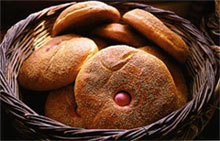
Ingredients:
- 10 cakes / 150g yeast
(if using active dry yeast follow
manufacturer's instructions)
- 13 cups / 1.5kg all-purpose flour
- 1 pinch of salt
- 2oz / 50g cinnamon sticks
- tsp mastic, powdered
- 8 eggs
- 1 3/4 cups / 400g sugar
- 1 generous cup / 250 ml milk
- 1 1/3 cups / 300g butter
- 1 egg yolk
- 1 hard-cooked egg, dyed red
- Sesame seeds or flaked almonds,
according to preference
|
Tsoureki (Greek Easter Bread) Recipe
Preparation:
Dissolve the yeast in a little lukewarm milk. Add 5
tablespoons of flour, stir well and leave to stand in a warm
place for one hour. Meanwhile, melt the butter, heat the
milk, and leave the both to cool. >
Place the cinnamon sticks in a small saucepan, adding enough
water to cover them, then bring to a boil and simmer for 10
minutes. Pour off the liquid and set it aside.
Pour in the melted butter, milk, and cinnamon water. Beat
the eggs and sugar together until frothy and add to the
other ingredients. Mix together thoroughly. Knead the dough
until it is completely smooth, then cover and leave to rise
in a warm place for about two hours.
Preheat the oven to 350F (180C). Once the dough has doubled
in size, punch it down and knead again thoroughly.
Roll out the dough into three long sausage shapes and plait
them into a large bun.
Place the dough onto a well greased baking sheet and brush
with egg yolk.
Press the red egg into the middle of the plait, sprinkle a
few flaked almonds over the top and bake in a preheated oven
for about 35-45 minutes until the bread it golden brown. |
|
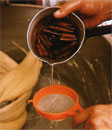
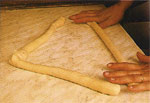
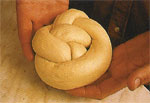
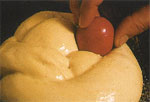
|
|
Easter Rituals
in Greece
The first full moon of spring heralds the high point of the
church year in the Greek Orthodox calendar. Devout Christians have
been fasting for 40 days, in other words going without meat, cheese
and eggs. Even the less devout respect the fasting rules during
"Holy Week," the week before Easter Sunday.
It is difficult to say precisely why there is a special magic about
the Greek Easter festival. It is true that spring festivals have
been held at this time for the year since pagan times to reawaken
the spirits of nature. Even now, witnessing a Greek spring can be an
almost reverential experience and there can scarcely be anyone who
does not succumb to its magic. In the week before Easter, this
season of rebirth, people congregate on a daily basis to celebrate
with growing anticipation the resurrection of Christ. During this,
the most important festival in the Orthodox Church calendar, any
cultural, ethnic, religious, or even culinary differences between
the mainland and the Greek islands are forgotten.
However, this final week in the run-up to Easter is a demanding time
for the faithful. Each day, there is a church service lasting
several hours, in which the Stations of the Cross are visited and
the Gospels preached. At home, it is full stream ahead with
spring-cleaning and preparing food for the coming festival. None of
the important Easter specialties must be left out: candies, plaited
bread rolls, fresh eggs, and drinks must be brought or carefully
prepared. New clothes must be bought for the children.
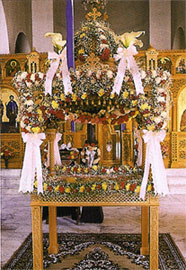 On the Wednesday before Easter, the church candleholders are
sprinkled not as they usually are with sand, but with flour. After
the service, the women bake this into a loaf of bread and have it
blessed in church. Maundy Thursday's preparations focus on dyeing
the eggs and the evening mass is very taxing even for the most
devout souls. All the Gospels are read in a service, which seems to
go on forever. On the Wednesday before Easter, the church candleholders are
sprinkled not as they usually are with sand, but with flour. After
the service, the women bake this into a loaf of bread and have it
blessed in church. Maundy Thursday's preparations focus on dyeing
the eggs and the evening mass is very taxing even for the most
devout souls. All the Gospels are read in a service, which seems to
go on forever.
During Thursday night, everyone goes into deep mourning. The church
icons are covered with dark cloths and the might church bells fall
silent until Easter Sunday. The Epitaphios, the symbolic
representation of Christ's tomb, which has held pride of place in
the church, is garlanded with flowers.
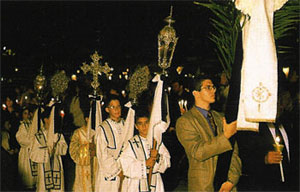
On Good Friday evening, it is ceremoniously carried through the
village in a magnificent candlelit procession, followed by the
priest and the entire congregation.
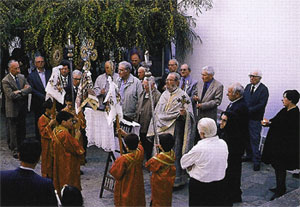
Finally, Easter Saturday arrives and everyone is occupied with
last-minute food preparations as there will be no time left later in
the evening. Everyone proceeds to church with their Easter candles
and red-dyed hard-cooked eggs - red to symbolize the blood of
Christ. Prayers and singing continue all through the evening vigil
until midnight when the priest announces the words of deliverance:
"Christ is risen."
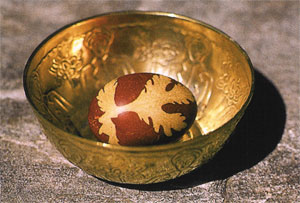
The bells right out, people embrace each other, exchange greetings,
and band their red eggs together - whoever's egg lasts longest
without cracking will have good luck the following year - before
hurrying home for mayiritsa, fresh Easter soup, which is already
steaming in anticipation. Lent is over for another year.
Happy Easter from everyone here at GreekShops!
|
This article was featured in our April 2006 newsletter.
Past newsletters can be viewed in our
newsletter archive. |
 Excerpt
from: Excerpt
from:
Culinaria Greece
by Milona Marianthi |
|
|
|
|
|
What's New!
|
We are
taking pre-orders for Tsoureki Greek Easter Bread!
Enjoy freshly baked traditional braided sweet Greek Easter bread topped with three red eggs and sliced almonds. Made fresh by a local Los Angeles bakery.
Approximate weight is 2.5lbs.
Bread will begin shipping on Monday April 18th. Please allow 4-5 business days for delivery. USA orders only, while supplies last.
|

Click here to order |
|
|
Sterling Silver & Gold Jewelry |
|
|
Greekshops.com
is joining the global effort to reduce waste and
will no longer be using plastic bags in our Santa
Monica store. We will be offering these canvas bags
free to customers who purchase over $100 worth of
merchandise locally or online!
Just mention this
offer in the Special Instructions box during
checkout and we will include a free bag with your
order!
Bags can be purchased
here |
 |
|
|
Women's Apparel & Costume Jewelry |
|
|
|
2012 Greek Island Calendarss |
|
|
|
Children's Department |

I proti mou vivlos, My First Bible, In Greek |

Istories apo tin Vivlo, Bible Stories, In Greek |

To proto mou Pashalino Vivlio, My First Easter book, for Preschoolers, In Greek |

Pou Pige to Pasha, Where did Easter Go?, by Vagelis Iliopoulos, In Greek |

Mia Koufi Kambana tin Anastasi, by Ioanna Skarlatou, In Greek |

Pasha Ellinwn : Ennea Istories kai ena Poiima apo Ellines Syngrafeis, in Greekk |

Mia Pashalini Istoria, by Brian Wildsmith, In Greek |

My First School World Atlas (In Greek) |

Min Psaronis by Arkas, In Greek |

Greek Mythology 10 DVD Collection (PAL/Zone 2) |

Homer's Odyssey 10 DVD Collection (PAL/Zone 2) |

Aesop's Fables 10 DVD Collection (PAL/Zone 2) |

Children's Spiral Mati Evil Eye Bracelet with Multi-Color Beads BI345 |

Children's Mati Evil Eye Bracelet with Multi-Color Beads BI385 |

Children's Mati Evil Eye Bracelet with Multi-Color Flower Beads BI380 |
|
|
Greek Music & DVDs |

Greek National Anthem and Music |

Greek National Marching Music |

Greek National Dances Vol 2 |

18 Tragoudia tis Roumelis |

18 Kampisia, Tsamika & Syrtokagelia - Sti Roumeli & Stou Moria |

Difono 2011 (3CD) |

Pop Rok 2011 (3CD) |

Dio Nihtes Mono, Pashalis Terzis (Cd + Book) |

Next Level, Lefteris Pantazis (2CD) |

Pazl, Keti Garbi |

Olokenourgios, Panos Kiamos |

I skepsi mou mono, Nikos Kourkoulis |

Yparhoun Dyo Ellades, Antipas (2CD) |

O Erotikos, Yiannis Parios (6CD) |

60 Megales Epityhies, Notis Sfakianakis (5CD) |

The Best of Panos Kiamos (CD + DVD) |

Palies Agapes & Tragoudia Methismena, Tania Tsanaklidou (2CD) |

Duende, Elenh Peta |

Tin Alithia Na Po, Filipos Pliatsikas (3CD) |

Stou Paradisou To Vitho, Babis Tsertos |

Best of Panos Kiamos (CD + DVD) |

Gialina Ftera, Antzela Dimitriou |

Po Po Po, Sotis Volanis |
|

Dogtooth DVD (NTSC) |
|
|
Books
in Greek |
|
|
|
Classic Finos Films |
|
|
|
Latest
Arrivals |
|
Ancient Greek Toys & Museum Replicas |
|
"One of a
kind" museum quality ceramic
reproductions!
Each piece is made from clay that
originates in the same field where
the original was found, ensuring the
same look & feel.
Many of the original artifacts are
featured in this book! ----> |

Toys of the Ancient Greeks by Chris D. Lazos
(In Greek)
|
|
|

Boeotian Terracota Doll 8th century BC Replica, Archaelogical Museum of Athens
|

Ancient Greek Jointed Athena Doll (Daidali) replica, National Archaelogican museum of Athens
|

Ancient Greek Clay Horse toy replica, 4th Century BC, National Archaeologican museum of Athens
|

Ancient Greek Children's Spinning Top Replica, Archaeological Museum of Theves
|

Ancient Greek Marbles Replicas from the National Archaeologican museum of Athens
|

Ancient Greek Clay Rattle - Seistron Replica, Museum of Heraklion
|

Minoan Bull 1550 BC Replica, Museum of Heraklion
|

Terracota Minoan Ram Replica, 1550 BC, National Archaelogican museum of Athens
|

Tanagra Clay Cicada Replica 450 BC, Archaelogical Museum of Athens
|

Owl Replica from the Archaic Period 500 BC, Archaelogical Museum of Athens
|

Terracota Tree of Life with seven Birds replica, 1100 BC, Museum of Heraklion
|

Ancient Greek Double Spindle Whorl Replica Neolithic Period, Archaeological Museum of Lefkada
|

Ancient Greek Single Spindle Whorl Replica Neolithic Period, Archaeological Museum of Lefkada
|

Knossos Oil Lamp 1550 BC Replica, Museum of Heraklion
|

Ancient Greek Aryballos (Oil bottle), 650-640 BC, Museum of Delphi
|

Tanagra Goddess Figurine 3rd Century BC Replica
|

Terracota Mycenean Goddess, 1400 - 1200 BC, National Archaelogican museum of Athens
|

Terracota Female Figurine, Cypriot Late Bronze Age Replica, Cyprus Museum
|

Clay Mother Goddess figurine, Early Bronze Age Replica, Cyprus Museum
|

Neolithic Female Figurine replica from Farsala, Athanassakeion Museum of Volos
|
|
|
Greek Orthodox Icons & Komboskini Prayer Ropes |
|
|
|
Vintage Greek City Photo & Advertisement Posters |
|
|
| Featured Destination: Cyclades -
Melos (part
6 of 22) |
|
 GEOGRAPHY
Milos differs from the other isles of the Western
Cyclades on account of its volcanic geomorphology, to
which it owes its mineral resources. Surface area 151
sq. km., length of coast 126 km., distance from Piraeus
86 nautical miles. There are both car and passenger
ferries from Piraeus, connections with Siphnos, Seriphos
and Kimolos, via the route Piraeus-Kavala, with
Pholegandros, Anaphi, Santorini, Aghios Nikolaos and
Siteia in Crete, the Dodecanese and the islands of the
east and north Aegean (once a week throughout the year).
There is a local link with Kimolos and, during the
summer, with Siphnos. Last but not least, there are
flights from Athens. The island's capital is Melos (Plaka)
and its population of 4,554 is engaged in agriculture,
fishing and trade. The climate is mild, vegetation quite
rich, the landscape lovely and there are plenty of sandy
beaches beside its clear sea. There are good tourist
facilities capable of providing services for many
holidaymakers, attracted by its scenery, places of
interest and the quiet island life of its attractive
villages. GEOGRAPHY
Milos differs from the other isles of the Western
Cyclades on account of its volcanic geomorphology, to
which it owes its mineral resources. Surface area 151
sq. km., length of coast 126 km., distance from Piraeus
86 nautical miles. There are both car and passenger
ferries from Piraeus, connections with Siphnos, Seriphos
and Kimolos, via the route Piraeus-Kavala, with
Pholegandros, Anaphi, Santorini, Aghios Nikolaos and
Siteia in Crete, the Dodecanese and the islands of the
east and north Aegean (once a week throughout the year).
There is a local link with Kimolos and, during the
summer, with Siphnos. Last but not least, there are
flights from Athens. The island's capital is Melos (Plaka)
and its population of 4,554 is engaged in agriculture,
fishing and trade. The climate is mild, vegetation quite
rich, the landscape lovely and there are plenty of sandy
beaches beside its clear sea. There are good tourist
facilities capable of providing services for many
holidaymakers, attracted by its scenery, places of
interest and the quiet island life of its attractive
villages.
HISTORY Melos holds an outstanding place in the
history of the Aegean area in general. Inhabited since
prehistoric times, it attained pre-eminence during the
period of the Cycladic civilization. Tools and artefacts
of Melian obsidian have been found not only in the
Cyclades but also in Crete, indicating the island's
advanced development. Around the middle of the 2nd
millennium BC it came within the Minoan sphere of
influence and not long afterwards Mycenaeans settled
here, to be followed by Dorian colonists in around 1000
B.C. Melos fought in the Persian Wars but because of its
insistence on neutrality during the Peloponnesian War
the Athenians launched two punitive campaigns against
it, laying waste the land, decimating the male
population and putting the women and children in
bondage. Ten years elapsed before the island was
resettled. In Hellenistic times it belonged to the
Macedonians, heralding a new era of prosperity, based on
the export of its mineral wealth. This acme is verified
by such artistic creations as the Aphrodite (Venus) of
Milos and the statue of Poseidon. There followed the
Roman occupation and then the Byzantine era when it was
harassed by pirates. At about this time (circa 800 AD)
the area of Kastro was inhabited, being rebuilt later by
the Venetians, who governed Melos under the Franks. It
was sacked by Barbarossa in 1537 and later subjugated by
the Turks. Throughout the Turkish occupation its harbor
was a refuge for corsairs. Melos played an active role
in the Struggle for Independence and was liberated along
with the rest of the Cyclades. In 1853 Sfakiotes from
Crete settled here, establishing its present port,
Adamas.
 SIGHTS-MONUMENTS
Melos' unusual shape is a consequence of volcanic
activity in the depths of the harbour at Adamas. This is
one of the largest natural harbours in the Mediterranean
and the small town on its creek with its snow-white
houses and cobbled streets is a hub of tourism and
commerce. The important church of the Holy Trinity with
its valuable icons is located here. Plaka, the island's
main town, stands on a hill above the harbour (4.5 km.),
its characteristic Cycladic houses commanding a unique
view of the Aegean. It is dominated by the mass of its
castle, to which the cobbled streets lead up beneath
archways. The churches of the Virgin Thalassitria and
St. Eleousa are preserved. Housed in the local Museum
are notable finds from Neolithic times to the present,
outstanding among which are the Cycladic figurines,
obsidian tools and artefacts. The Folk Museum is housed
in a 19th century building, along witha creditable
library. From the top of the castle one can survey the
villages of Trypiti, Triovasalos and Pera Triovasalos. 2
km. south of Plaka is Klima, site of the ancient city of
Melos in historical times, where sections of the
fortification wall (6th - 5th century BC) have been
revealed in excavation, as well as the auditorium of the
theatre near Treis Ekklesies. Here too there are remains
of an Early Christian baptistery and a three-aisled
basilica, near which the site of the ancient stadium has
been located. It was in this area that the statue of the
Venus of Melos (now in the Louvre) was recovered in
1820. 7th century BC pottery has also been found here,
as well as a number of so-called Melian vases with
polychrome representations in the Orientalising style. SIGHTS-MONUMENTS
Melos' unusual shape is a consequence of volcanic
activity in the depths of the harbour at Adamas. This is
one of the largest natural harbours in the Mediterranean
and the small town on its creek with its snow-white
houses and cobbled streets is a hub of tourism and
commerce. The important church of the Holy Trinity with
its valuable icons is located here. Plaka, the island's
main town, stands on a hill above the harbour (4.5 km.),
its characteristic Cycladic houses commanding a unique
view of the Aegean. It is dominated by the mass of its
castle, to which the cobbled streets lead up beneath
archways. The churches of the Virgin Thalassitria and
St. Eleousa are preserved. Housed in the local Museum
are notable finds from Neolithic times to the present,
outstanding among which are the Cycladic figurines,
obsidian tools and artefacts. The Folk Museum is housed
in a 19th century building, along witha creditable
library. From the top of the castle one can survey the
villages of Trypiti, Triovasalos and Pera Triovasalos. 2
km. south of Plaka is Klima, site of the ancient city of
Melos in historical times, where sections of the
fortification wall (6th - 5th century BC) have been
revealed in excavation, as well as the auditorium of the
theatre near Treis Ekklesies. Here too there are remains
of an Early Christian baptistery and a three-aisled
basilica, near which the site of the ancient stadium has
been located. It was in this area that the statue of the
Venus of Melos (now in the Louvre) was recovered in
1820. 7th century BC pottery has also been found here,
as well as a number of so-called Melian vases with
polychrome representations in the Orientalising style.
In
1840 the famous Katakomves (catacombs) were uncovered at
Klima, counterparts of those in Rome and the only
monuments of that kind. They consist of a system of
underground passages 180 m. long and divided into three
unequal sectors. Dated to the 3rd and 4th century AD,
they were a place of asylum for the first Christians and
also the place where they buried their dead. Indeed some
2000 bodies were laid to rest in graves along the
passages and recesses. It is not possible to visit the
catacombs. 12 km. east of Plaka is the village of
Apollonia or Pollonia with its lovely seashore. Some 3-4
km. before this village is the prehistoric city of
Phylakopi where excavations have brought to light three
successive levels dated, on the basis of the finds, to
the Early Cycladic (City I) Middle Cycladic (City II)
and Mycenaean (City III) period, the latter with its
palace and fortified enclosure. Finds from this general
area (mainly pottery and obsidian) have considerably
augmented our knowledge of the Early Cycladic
civilization. Beneath the ancient city are the three Papafranga caves, formerly a pirates' lair. Southeast of
Adamas (8 km.) is the village of Zefyria on the desolate
site of Palaiochora which was abandoned at the end of
the 18th century. To the north of the village is the
ruined church of Christ, as well as the deserted,
fortress-like monastery of the Virgin Kastriani. The
churches of the Virgin Portiani (in which sections of
wall-paintings are preserved) and St. Charalambos are of
17th century date. Among the island's Byzantine
monuments is the church of the virgin at Kipos (5th
century), while one of the oldest monasteries is that of
St. Marina at Chalakas. The beach at Chivadolimni (8 km.
from Adamas) is perhaps the most beautiful on the
island. There are holiday villages at Palaiochori and
Emboreio. All the beaches around the bay of Melos are
delightful, as are those at Apollonia, Provatas and
Mandrakia. There are therapeutic springs at Adamas, in
the gulf of Provatas and at Alyki. On the southwest side
of the island, below the monastery of St. John, is the
Smaragdenia cave (Emerald cave) or Sykia, where the
sunbeams filter through part of the roof, creating
emerald reflections in the calm waters of the grotto. In
the cliffs further south (3 miles) are the caves known
as Thalassina Meteora or Kleftiko from which pirates
launched their raids.
Fringing the north coast of the island are diverse rocky
islets of volcanic origin (Akrathi, Arouda, Erimomilos),
while in the vicinity of Pollonia there are the
Glaronisia, one of nature's rarest and most impressive
creations. They are formed of symmetrical, hexagonal
columns of basalt, vertically or obliquely aligned and
up to 20 m. high. To sail between them in a boat or
caique is a truly memorable experience. For those with a
boat there are several other wonderful beaches (Chivadolimni,
Emboreio, Provatas) and nearby islets and there is a
refueling station for yachts at Adamas. Visitors may
choose accommodation in hotels, rooms or furnished
apartments.
Next month:
The Islands of the Cyclades - Kimolos, Part 7 of 22
| |
|
April
2011 Greek Orthodox Calendar |
|
Sunday |
Monday |
Tuesday |
Wednesday |
Thursday |
Friday |
Saturday |
|
|
|
|
|
|
1
Cheesefare Thursday
Gerasimos the Righteous of Jordan
Paul & his sister Juliana and their Companions
|
2
Cheesefare Saturday
Konon the Gardener
Theodore the Recruit
|
3
Forgiveness Sunday
42 Martyrs of Amorion in Phrygia
Finding the Precious Cross by St. Helen
|
4
First Monday in Lent
The 7 Hieromartyrs of Cherson
Lavrentios of Megara, the Righteous
|
5
First Tuesday in Lent
Theophylaktos, Bishop of Nicomedea
Hermas the Apostle of the 70
|
6
40 Martyrs at Lake Sebaste
Caesarios the Righteous
|
7
First Thursday in Lent
Kodratos the Martyr & his Companions
Anastasia of Alexandria
|
8
First Friday in Lent
Sophronios, Patriarch of Jerusalem
Theodora the Righteous
|
9
First Saturday in Lent
Theophanes the Confessor
Symeon the New Theologian
|
10
Sunday of Orthodoxy
Removal of the relics of Nicephoros, Patriarch of Constantinople
Pouplios the Martyr, Bishop of Athens
|
11
2nd Monday of Lent
Benedict the Righteous of Nursia
Euschemon the Confessor, Bishop of Lampasakos
|
12
2nd Tuesday of Lent
Agapios the martyr & his Companions
Manuel the New Martyr of Crete
|
13
2nd Wednesday of Lent
Savinos the Martyr of Egypt
Christodoulos the Wonderworker of Patmos
|
14
2nd Thursday of Lent
Alexios the Man of God
Saint Patrick, the Enlightener of Ireland
|
15
2nd Friday of Lent
Cyril, Patriarch of Jerusalem
Trophimos & Eukarpion, Monk-martyrs of Nicomedea
|
16
Second Saturday in Lent
Chrysanthos & Daria the Martyrs
Demetrios the New Martyr
|
17
Sunday of St. Gregory Palamas
Righteous Fathers slain at the Monastery of St. Savas
Saint Cuthbert the Wonderworker, Bishop of Lindisfarne
|
18
3rd Monday of Lent
James the Confessor
Thomas I, Patriarch of Constantinople
|
19
3rd Tuesday of Lent
Basil the Holy Martyr of Ancyra
Kalliniki & Vassilisa the Martyrs
|
20
3rd Wednesday of Lent
Nikon the Holy Martyr & his 200 Companion Martyrs
Anatolios & Protoleon the Martyrs converted by the martyrdom of St. George
|
21
3rd Thursday of Lent
Forefeast of the Annunciation of the Theotokos
Saint Tikhon, Patriarch of Moscow
|
22
Annunciation of the Theotokos
|
23
Synaxis in honor of the Archangel Gabriel
26 Martyrs in Crimea
Irenaeus the Hieromartyr of Hungary
|
24
Sunday of the Holy Cross
Matrona of Thessaloniki
Paul, Bishop of Corinth
|
25
4th Monday of Lent
Hilarion the New
Herodion the Apostle of the 70
|
26
4th Tuesday of Lent
Mark, Bishop of Arethusa
Martyr Cyril the Deacon and Those with him
|
27
4th Wednesday of Lent
John Climacus the Righteous, author of The Divine Ladder of Ascent
Sosthenes Apollos, Cephas, Caesar, & Epaphroditos, the Apostles of the 70
|
28
4th Thursday of Lent
Hypatios the Wonderworker
Innocent, Enlightener of Siberia & Alaska
|
29
4th Thursday of Lent
Hypatios the Wonderworker
Innocent, Enlightener of Siberia & Alaska
|
30
4th Thursday of Lent
Hypatios the Wonderworker
Innocent, Enlightener of Siberia & Alaska
|
|
|
Icons
depicting the celebrated Saint, make great gifts for
namedays, as do our custom-made Greek name mugs.
Shop among our great collection of gift ideas at our
store. We also have a great selection of greeting cards
for birthdays, holidays, namedays and
special occasions.
|
|
Share
With Others! |
Let your family and friends share the savings by
forwarding them this email.
|
|
Suggestions
& Comments |
Dear Greekshops.com customer,
Thank you for contributing to our effort to bring
unique and hard to find Greek products to your home. We
value your opinion, so please let us know if you have
any concerns, suggestions, comments that will improve
and help us grow. Send us your feedback at:
[email protected]
|
|
Subscription
Information |
|
Missed an issue of our
newsletter? Now you can access past newsletters by
visiting
http://www.greekshops.com/newsletters_archive
To
unsubscribe from our mailing list,
click here
|
|
|
|
|
|

